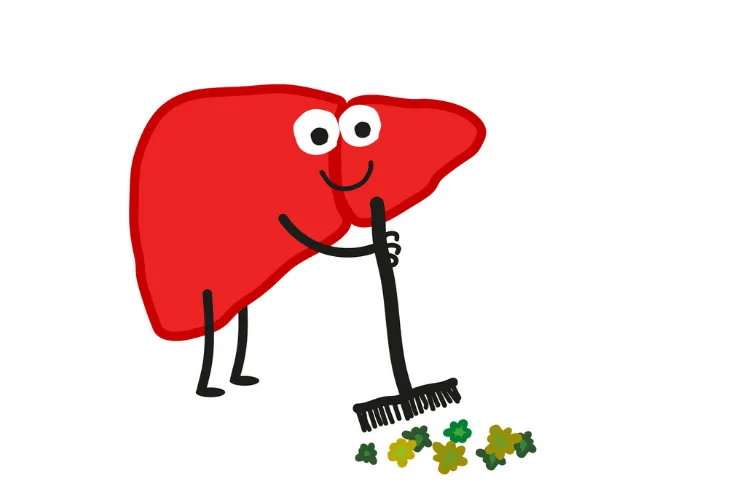Your liver is one of the most important organs in your body. Not only does it help eliminate waste from your system through the production of bile, but it also helps to flush out potentially harmful bacteria and toxins from the bloodstream, and even converts excess sugar (glucose) to glycogen for energy when you need it.
That’s really just the tip of the iceberg. Hopkins Medicine says “more than 500 vital functions” are associated with the liver, so it makes sense to keep it as healthy as possible. Here are some signs that your liver may not be working optimally, and some advice on how to avoid these symptoms…
Swelling in Your Abdomen/Legs
According to the Cleveland Clinic, fluid retention (that leads to swelling) is the most common sign of liver disease. It’s associated with cirrhosis of the liver, which the source says may not have early symptoms but can have serious health implications.
With cirrhosis, healthy liver tissue is replaced by scar tissue. The related distension of the abdomen or swollen legs is due to higher blood pressure in the liver veins, or the liver’s inability to produce albumin that prevents leaks from the bloodstream into tissues.
You’ve Lost Your Appetite
According to Healthline, having little (or no) appetite could be a sign your liver is in trouble, especially if you enjoyed generous portions in the past. The source cites information that explains “feeling full after eating a small amount of food” can be a red flag for liver issues.
More specifically, the source says liver cancer can be a cause of appetite loss (those who have cirrhosis have an increased risk of developing this type of cancer). Loss of hunger is also associated with early chronic liver failure, which can progress to fluid buildup, “severe skin itching,” and jaundice.
You’re Feeling Unusually Dizzy or Confused
Hopkins Medicine says liver problems might lead to liver encephalopathy, which is a fancy medical term for a negative impact on the nervous system from toxic substances building up in your system. Your liver is supposed to remove these harmful substances before these problems occur.
According to the source, liver encephalopathy can present as a wide range of symptoms – including mood changes, “impaired consciousness,” and even loss of consciousness. It also lists seizures (although rare) and a coma as other possible outcomes.
 Pheelings media / Shutterstock
Pheelings media / ShutterstockPain in Your Abdomen
Medicine Net explains that feeling pain in your upper abdomen “is one of the first signs of a potentially serious problem.” It lists risk factors that might lead to discomfort in your liver region, which is actually located on the upper right side of the abdomen.
Factors leading to this pain may include exposure to toxins (from consuming pesticides on food or household chemicals that enter your bloodstream). It also mentions certain herbs and supplements as a culprit, along with excessive alcohol consumption and underlying health issues including diabetes. All of these pain risk factors can increase the likelihood of liver disease.
You’re Getting Worn Out Easily
There are many conditions that can leave you feeling fatigued or excessively tired. One of those potential causes may be viral hepatitis, which is inflammation to the liver as a result of the viral infection, notes Healthline.
There are different types of Hepatitis, but all of them affect your liver, notes the source. The symptoms may start off “flu-like” and then progress to other issues such as decreased energy, abdominal pain, nausea, and loss of appetite, it adds. The source notes hepatitis can be spread through contaminated food/water as well as bodily fluids.
Blood in Your Vomit or Stool
Hopkins Medicine explains that “painless vomiting of blood” or “black, tarry or bloody stools” can be a sign of something called esophageal varices. In short, the source notes this condition is blood vessels in the lower esophagus that are prone to bleeding, which is associated with severe liver disease.
The diseased liver can cause hypertension (high blood pressure) in the veins of the liver — more specifically the portal vein that supplies blood to the organ. The blood vessels grow as a result and reach the lower esophagus, “and are prone to rupture.” Along with bloody vomit/stools, esophageal varices can also lead to decreased urine, excessive thirst, and light-headedness.
You’re Running Fevers
Healthline says that running fevers is a progressive symptom of fatty liver disease, which is divided into two types, alcoholic and non-alcoholic. While it doesn’t usually show many signs in the early stages, alcoholic fatty liver disease (as a result of excessive, long-term alcohol consumption) can lead to spiking temperatures, as well as nausea, vomiting, and jaundice (yellowing of the skin and whites of the eyes).
Meanwhile, the non-alcoholic variety (which may be influenced by diet, although there could be undetermined factors) can cause many of the other symptoms mentioned already, from fatigue to decreased appetite. It can also lead to unexplained weight loss, notes the source.
Your Sleep Patterns Are Out of Whack
Many conditions can interrupt your regular sleep cycle, from depression to sleep apnea. But Best Life Online says if your “sleep patterns are inconsistent,” it could be a sign of trouble with your liver.
The source cites a study that suggests one of the possible reasons you’re not getting proper sleep is because you have cirrhosis of the liver, “which can make it especially hard to get a good night’s rest—even if you’re counting sleep like it’s your job.” The study, published in the Egyptian Journal of Chest Diseases and Tuberculosis, found that patients had sleep disturbances “correlating with the degree of cirrhosis.”
You Bruise Easily
Are you noticing more bruises on yourself, but don’t remember the cause of them? This could be a red flag that your liver is in trouble, according to Medical News Today. More specifically, it blames alcohol abuse as a factor, which can lead to cirrhosis and other liver diseases that “slowly undermine liver function.”
The reason for the easier bruising is due to the liver not producing proteins that help the blood to clot. As a result, you’ll bruise and even bleed more easily, the source adds (a bruise is just blood trapped under the skin.) There can be other accompanying symptoms including itchy skin and swelling.
Joint Pain
You may first associate joint pain with arthritis, but it also might be from a genetic condition that can lead to damage to the liver, explains Healthline. For example, the source mentions hemochromatosis, which basically means your body is storing too much iron in your organs. There’s also Wilson’s disease, which causes your liver to hang on to copper it should be releasing.
These genetic conditions (along with Alpha-1 antitrypsin deficiency that can make you cough up blood) can result in a range of other symptoms that are similar to other liver diseases, such as fatigue, decreased appetite, jaundice – and in this case, joint pain. The exact symptoms may differ depending on the underlying condition.
When to See a Doctor
The Mayo Clinic says you should book a visit to your doctor if you have “persistent” signs and symptoms “that worry you,” whether that’s swelling in the legs, itchy skin, nausea, or chronic fatigue.
If you’re doubled over because of abdominal pain and you can’t sit still for even a moment from the discomfort, then you should be seeking immediate medical attention, notes the source. Meanwhile, a blood test might reveal elevated liver enzymes, which is associated with a number of liver problems, the source notes.
Prevention Tips for Maintaining a Healthy Liver
There are several things you can do to help manage liver issues or even avoid them, to begin with. For example, if you’re experiencing fluid retention, then you might want to consider a low-sodium diet, explains Cleveland Clinic. Speaking of diet, you should keep your foods safe from contamination (that can cause hepatitis) by washing your hands thoroughly whether preparing or eating food. Maintaining a healthy weight can help you avoid non-alcoholic fatty liver disease.
Meanwhile, the Mayo Clinic says your doctor may recommend reducing your alcohol intake. Other prevention tips from the clinic include avoiding “risky behavior” and carefully choosing your tattoo shop for safety measures. You can also get vaccinated against hepatitis (that can cause liver issues) and you should closely follow any medication dosages, the source adds. Be sure to talk to your doctor before introducing any herbal supplements.














